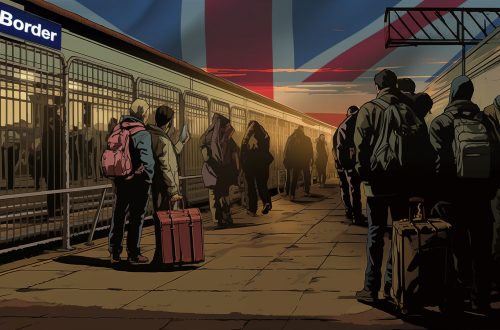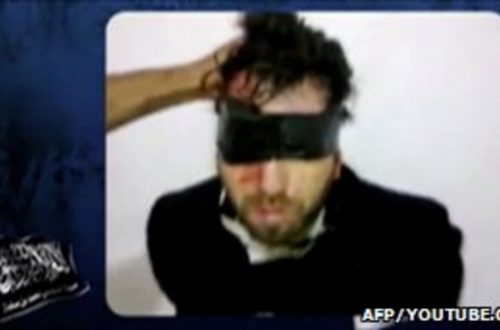Guest post by Marco Schneebalg
On the 28th of April 2010, after a conference hosted by the Politics society at the University of Manchester, some activists of “Action Palestine” tried to attack the Deputy Ambassador to Israel and eventually managed to block her car for some time.
These actions are unacceptable and I am sure they are doing anything but contributing to a peaceful solution to the conflict and an end to the occupation. However, I want to put the events back into their context and criticize the way they were portrayed by the Jewish Chronicle and Israeli media.
After the events, the Jewish Chronicle, Britain’s main Jewish weekly, and all of the big Israeli newspapers reported the attack in a very alarmist tone, making no further investigation on the matter. All the things reported in the articles are true. However, the talk went on quite peacefully and I feel that the situation in Manchester University is easing rather than getting more tense.
These are the facts that support this. For many years Manchester University has been a big centre for “pro-Palestine” activism. The Students’ Union is twinned with the one of Al Najah University in Nablus, and many motions have been passed over the years to “support the Palestinian cause”. Last year, during the Gaza War, after a month-long occupation of a University building, a motion was passed in the UMSU (University of Manchester Student’s Union) to join the Boycott Divestment and Sanctions movement against the state of Israel.
This year, the tensions came to a peak when Ms Lador Fresher, the Deputy Ambassador of Israel, was due to speak at the UMSU on the 18th of February. A big demonstration was organized by “Action Palestine” to protest against her coming, claiming that because of the BDS motion, no Israeli spokesperson should be allowed to speak in the Union. The talk was cancelled but the demonstration took place to “celebrate” this decision, taken by the Embassy because of security concerns. The Jewish Society responded with a counter-demonstration claiming that everybody should be allowed free speech in the Union. Some verbal clashes occurred and observers could testify to a pathetic scene of shouting slogans, one group against the other.
After these events, a group of people willing to create a place where students could debate and learn from each other created the Manchester Israel-Palestine Forum. This Forum, of which I am the chair, tries to promote dialogue and learning on the issues of the Israeli-Palestinian conflict and gathers members of Action Palestine, the Jewish Society and other students interested in the issues.
We had two events in the last few months. On the 9th of March, we had our first student forum on the theme “Gaza: what next?” After a short movie, a debate in little groups and a shared hummus break, students of the “two sides” made presentations on the history and on the issues in Gaza for the 100 people audience. Then, attendees had the opportunity to debate, to ask questions and to try to understand the other side. It is true that many people did not change their minds, but at least they had a peaceful and well-argued dialogue and the students that weren’t in touch with the issues had the possibility to learn and understand the views of both sides.
After this success, we organised on the 25th of March a conference on the theme “Israel-Palestine: Is the two states solution viable?” There we had four speakers from very different backgrounds and the debate was very lively and constructive. People from Action Palestine, the Jewish Society and unaffiliated students felt comfortable to express their views. Ruth Arkush, a Jewish student, said “For the first time, there was a panel with speakers from both sides on campus; it was very refreshing and positive after a lot of aggressive politics on campus”. I invite you to listen to the entire BBC Manchester report of the conference.
The activities of the Manchester Israel-Palestine Forum received very good feedback and helped ease the tensions between the two groups after the events that lead to the cancellation of the conference on the 18th of February.
Finally, the talk by Ms Lador Fresher on the 26th of April took place in a calm and constructive way. Security measures were very strict and some activists shouted at the beginning and had a silent protest throughout the speech. However, generally Ms Fresher could speak and be understood by the students. I feel that everybody learnt from this conference but that it would definitely have been better if a speaker who could balance her views had been on the panel. In the room, there was no apparent aggressiveness between the two groups and no one felt scared or intimidated to speak.
At the end of this conference, a minority of Action Palestine activists, most of whom had not been allowed inside, surrounded the building in order to attack the diplomat. After a ridiculous hide and seek game with the security of the University, they managed to disrupt her car for a few seconds.
In today’s society, what becomes important is not what really happened but how it is depicted in the media. The Jewish Chronicle and Israeli media didn’t say one word about all the positive events that happened on campus and the regained confidence in debate and understanding. However, they emphasised this attack and made the Manchester campus appear hostile and racist.
I assume positive signs are not emphasized because the public is interested in shocking news. But maybe it’s also because the media are interested in portraying pro-Palestine activists as violent, emphasising the fact that “the whole world is against us” rather than noticing the signs of dialogue and good will.
They created a message of hostility and violence to the point that the Israeli father of a member of the Jewish Society even called her saying “I saw the news on TV, you should be careful with all these anti-Semites and organise to defend yourselves!”
Members of the Jewish Society were shocked by how this marginal event was given so much importance and tried to complain to the media. Letters and phone calls were exchanged with the Jewish Chronicle, the first news site to publicise the event, but nothing was changed in the articles. I even wrote personally to all newspapers that publicised the event but got no response from them. What we can learn from this story is that when the “news momentum” is lost, nothing really matters anymore; only the shocking news itself stays for the people who weren’t there.
I think activism is very important to campus life but I don’t know how this attack by some members of Action Palestine contributed to the liberation of Palestine. What I am sure of is that it gave weight to the voices in Israel opposing dialogue with the Palestinians and to the perception that British universities are antisemitic.
I do not think the situation in Manchester campus is as “bad” as it is portrayed. I think the situation is becoming better and the tensions are actually decreasing, passing from a point of no dialogue and aggressiveness to a phase of debate and mutual understanding.
I hope the Manchester Israel-Palestine Forum will be able to carry on its activities and that marginal violent events won’t be given as much importance, leaving a way for constructive and positive developments.
This article reflects the opinion of its author and not of any other organisation.


